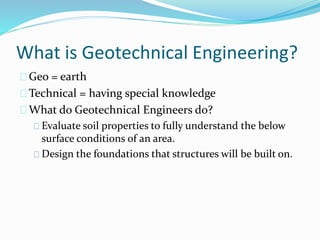The Best Guide To Geotheta
The Best Guide To Geotheta
Blog Article
Getting My Geotheta To Work
Table of Contents4 Simple Techniques For Geotheta4 Easy Facts About Geotheta DescribedGeotheta Can Be Fun For EveryoneGet This Report about GeothetaGeotheta Things To Know Before You Get This

They conduct website investigations, gather examples, perform laboratory examinations, and evaluate data to assess the suitability of the ground for construction projects - Geo Tech Engineer. Based upon their findings, geotechnical designers supply suggestions for foundation layout, incline security, retaining structures, and mitigation of geotechnical risks. They collaborate with various other specialists, such as architects, structural designers, and building and construction groups, to guarantee that geotechnical factors to consider are incorporated right into the total job layout and application
By evaluating the habits and buildings of dirt and rock, they can recognize possible geotechnical dangers such as landslides, dirt settlement, or slope instability. Their knowledge assists avoid failures or accidents that could endanger lives and home. Below are some comprehensive tasks and duties of a geotechnical designer: Website Investigation: Geotechnical engineers conduct website investigations to collect data on subsurface conditions.
They analyze the data to comprehend the homes and actions of the dirt and rock, including their stamina, leaks in the structure, compaction characteristics, and groundwater problems. Geotechnical Analysis and Style: Geotechnical engineers examine the information accumulated throughout site investigations to evaluate the security and viability of the site for building tasks. They perform geotechnical calculations and modeling to assess variables such as birthing capability, settlement, slope security, lateral earth pressures, and groundwater flow.
7 Simple Techniques For Geotheta
Foundation Style: Geotechnical engineers play a vital duty in developing foundations that can securely sustain the desired structure. They analyze the soil conditions and lots needs to identify the suitable foundation type, such as shallow foundations (e.g., grounds), deep foundations (e.g (https://www.merchantcircle.com/blogs/geotheta-miami-fl/2024/8/Why-Geotechnical-Engineers-at-Geotheta-Are-Your-Best-Bet/2781881)., stacks), or specialized methods like soil renovation. They take into consideration factors such as negotiation limitations, bearing capacity, and soil-structure communication to create ideal structure designs
They evaluate building plans, monitor site activities, and conduct field inspections to verify that the layout suggestions are complied with. If unpredicted geotechnical concerns arise, they assess the circumstance and supply recommendations for remediation or modifications to the design. Danger Analysis and Reduction: Geotechnical engineers examine geotechnical dangers and dangers associated with the project site, such as landslides, liquefaction, or dirt erosion.

Partnership and Communication: Geotechnical designers work closely with other experts included in a job, such as engineers, structural engineers, and building teams. Effective interaction and partnership are necessary to incorporate geotechnical factors to consider into the total job style and building and construction process. Geotechnical engineers provide technological knowledge, solution inquiries, and guarantee that geotechnical demands are fulfilled.
The Ultimate Guide To Geotheta
Here are some kinds of geotechnical designers: Structure look here Engineer: Foundation designers focus on making and analyzing structures for frameworks. They examine the soil conditions, lots requirements, and site characteristics to figure out the most proper structure type and layout, such as shallow structures, deep foundations, or specialized strategies like heap structures.
They examine the aspects affecting slope security, such as dirt residential or commercial properties, groundwater problems, and incline geometry, and develop approaches to stop incline failures and alleviate threats. Quake Engineer: Quake designers focus on evaluating and designing frameworks to hold up against seismic forces. They assess the seismic threat of a website, review soil liquefaction possibility, and develop seismic design criteria to make certain the security and resilience of frameworks during quakes.
They do area testing, gather examples, and analyze the collected information to identify the soil residential or commercial properties, geologic formations, and groundwater conditions at a site. Geotechnical Instrumentation Engineer: Geotechnical instrumentation designers concentrate on surveillance and measuring the actions of dirt, rock, and structures. They install and keep instrumentation systems that check aspects such as dirt settlement, groundwater degrees, slope movements, and architectural variations to analyze efficiency and supply early warnings of potential problems.
7 Easy Facts About Geotheta Shown
They carry out examinations such as triaxial examinations, combination examinations, direct shear examinations, and permeability tests to collect information for geotechnical analysis and design. Geosynthetics Designer: Geosynthetics engineers concentrate on the design and application of geosynthetic products, such as geotextiles, geogrids, and geomembranes. They make use of these materials to improve dirt security, enhance slopes, provide drain services, and control erosion.
They tend to be investigatory people, which means they're intellectual, introspective, and analytical. They are curious, systematic, logical, analytical, and rational. Some of them are additionally social, meaning they're kind, charitable, participating, client, caring, practical, understanding, tactful, and friendly - Engineer of Record.
In the office atmosphere, geotechnical designers use specialized software program devices to do computations, develop styles, and assess data. They prepare records, testimonial job specifications, connect with clients and team participants, and coordinate job activities. The office setting gives a helpful setting for study, analysis, and collaboration with other experts included in the job.
The Main Principles Of Geotheta
They frequently see project sites to perform site investigations, analyze geotechnical problems, and gather data for analysis. These check outs entail traveling to various places, sometimes in remote or difficult terrains. Geotechnical designers may carry out soil tasting, conduct tests, and monitor building activities to make certain that the geotechnical aspects of the project are being carried out properly.
Geotechnical designers additionally operate in specialized geotechnical labs. In these centers, they perform experiments, perform examinations on soil and rock samples, and examine the engineering residential or commercial properties of the products. Geotechnical laboratory designers work extensively in these environments, managing screening equipment, running tools, and taping data. They collaborate with various other lab staff to make certain precise and dependable screening outcomes.
Report this page